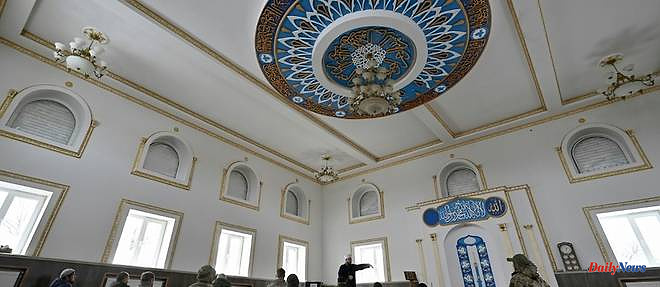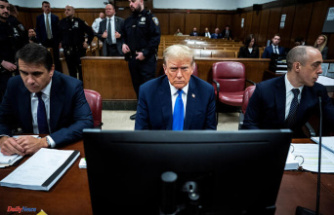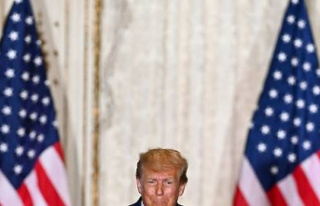For the second consecutive year, Muslims in Ukraine observe Ramadan in the midst of the Russian invasion. At a mosque near the frontline in the east of the country, most worshipers this week were soldiers in fatigues.
"I ask Allah to protect our mosque. I ask Allah to protect Ukraine (...) and to punish the tyrants", launches mullah Murat Suleimanov in his prayers.
"Ramadan is a month of victory," he told the small gathering of 16 people, including eleven in uniform and one woman.
The building of the mosque shows the scars of the war: many windows are broken and walls are riddled with shrapnel. A rocket exploded nearby two days earlier.
Among the faithful, Said Ismagilov, former spiritual leader of Muslims in Ukraine. After resigning before the war, he now works as a paramedic in a volunteer first aid team, which evacuates wounded soldiers.
Mr Ismagilov, 44, is Tatar, a predominantly Muslim ethnic group. He wears a patch of his ASAP Rescue battalion and shows his ambulance parked outside the mosque.
Said Ismagilov claims to feel "the will and protection of Allah" in case of danger. "It happened that my ambulance was riddled with shrapnel. Thank God I was not injured," he says.
When the war broke out, he had held the position of mufti of the Ukrainian religious administration Umma for 13 years. But the mosque where he officiated emptied as the evacuations took place.
“I realized that I was useless,” he explains. He says he chose to "stand up and defend (his) homeland".
Last year, he spent Ramadan in Lysytchansk, a city that suffered extremely heavy shelling before Russian troops seized it.
Mr. Ismagilov assures that he can still respect the rules of the fast.
"I got used to spending Ramadan at war, so this year is nothing new for me," he says. "I have everything I need to fast, in accordance with all Muslim traditions."
"I am no longer in the trenches. I spend most of my days driving or going to the stabilization point", a building where the wounded are taken to give them first aid.
He also tries to dedicate a few hours to prayer at night.
"It is difficult for the Muslims who have to stay in the trenches. They are cold and there is a lot of water because it often rains... It is difficult to be a Muslim there", continues Said Ismaguilov.
He says he doesn't know how he will celebrate the end of Ramadan, Eid al-Fitr, later this month.
"You're lucky if you manage to get to a mosque and you never know how many people will come, or if they will," he says.
In case of intense bombardments, they pray in a basement.
Born in the city of Donetsk, now under Russian occupation, Said Ismaguilov studied theology at an Islamic university in Moscow, before becoming an imam in his native city.
Although he grew up in a largely Russian-speaking region, today he prefers to speak Ukrainian.
"I find it appalling that Russian Muslims support the war," he said, accusing Moscow of treating its minorities like "cannon fodder".
Ramadan requires believers to abstain from food and drink from dawn to dusk for a month.
"I am absolutely sure that many Muslim fighters participating in the fighting would like to fast... because in this case, they feel even better with the help of Allah", assures Mufti Suleimanov to AFP, who replaced Mr. Ismagilov in November.
A soldier outside the mosque explains that they fast, as most Muslim soldiers do, unless they are on a combat mission.
"When you go to the front line, it is permissible not to fast. If it is not hot and you are not tormented by thirst, then you can fast," he explains.
04/04/2023 09:01:24 - Donetsk region (Ukraine) (AFP) - © 2023 AFP












